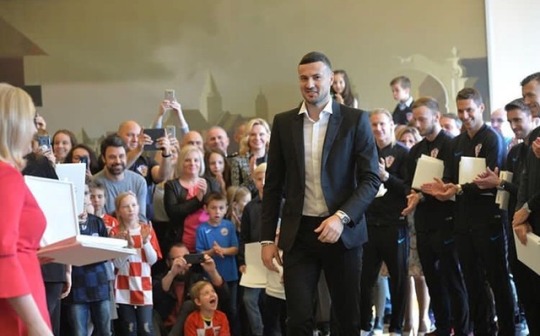#kolinda grabar kitarović
Explore tagged Tumblr posts
Text
“Ona se želi svim silama oprati zbog odnosa s Vladimirom Putinom, koji je bio blizak. Ali nemoj to raditi preko hrvatske grbače, nađi drugi način. Očito želiš negdje van. No te fotografije gdje trčiš u mokroj majici po Lužnjikiju… Moskva se još trese od toga. Neću se opravdavati, to je imbecilno, dobio sam izbore, to je činjenica. Možda su mi pomogli Kinezi”, rekao je kroz smijeh Milanović.
Facepalm.
Ali Milanović je i dalje nemjerljivo normalniji i općenito bolji nego kokoš Kolinda za koju srećom više rijetko čujemo.
0 notes
Text
Picrew Animated Portraits of World Politicians 5
After the fourth part, I made the fifth one for my "Picrew Animated Portraits of World Politicians" collection with an image maker. It also consists of 12 more politicians from different countries.



French Prime Minister Gabriel Attal (left), Swiss President Viola Amherd (middle) & former French President François Hollande (right)



Swiss Vice President Karin Keller-Sutter (left), former President Alain Berset (middle) & Federal Councillor Élisabeth Baume-Schneider (right)



German Chancellor Olaf Scholz (left), Georgian President Salome Zourabichvili (middle) & Polish President Andrzej Duda (right)



Serbian Prime Minister Ana Brnabić (left), Greek Prime Minister Kyriakos Mitsotakis (middle) & former Croatian President Kolinda Grabar-Kitarović (right)
1 | 2 | 3 | 4 | 5 | 6 | 7 | 8 | 9 | 10 | 11 | 12 | 13 | 14 | 15
#world leaders#olaf scholz#alain berset#françois hollande#gabriel attal#kyriakos mitsotakis#ana brnabić#kolinda grabar-kitarović#andrzej duda#politicians#politics#lolitics#picrew#illustration
6 notes
·
View notes
Text
Sandeep Marwah Met Former President of Croatia Kolinda Grabar-Kitarović

New Delhi: Renowned film and media personality, Sandeep Marwah, recently met with the former President of Croatia, Kolinda Grabar-Kitarović, to discuss art and culture. During their meeting, they emphasized the importance of cultural exchange and explored ways to strengthen cultural ties between India and Croatia.
Marwah shared his experiences of promoting cultural diplomacy through film festivals, art exhibitions, and other cultural events. He also discussed the role of media and entertainment in fostering cross-cultural understanding and appreciation.
Grabar-Kitarović expressed her admiration for India’s rich cultural heritage and emphasized the need for greater collaboration between Indian and Croatian artists and cultural institutions. She also shared her vision for using cultural diplomacy as a means of promoting peace and harmony in the world.
The meeting between Sandeep Marwah and Kolinda Grabar-Kitarović is expected to pave the way for closer cultural ties between India and Croatia. By fostering greater understanding and appreciation of each other’s cultures, the two countries can build strong and lasting bonds of friendship and cooperation.
H.E. Peter Ljubicic Ambassador of Croatia to India, Director General of Indian Council for Cultural Relations Ambassador Kumar Tuhin, former Indian Ambassador to Croatia, Deputy Director General ICCR Rajeev Kumar, Senior Programme Director Kamal Jit Singh, and Joint Secretary Ministry of External Affairs Ravi Shankar were also present there.
#Sandeep Marwah with former President of Croatia Kolinda Grabar Kitarović#Dr. Sandeep Marwah President of Marwah Studios
1 note
·
View note
Note
Help, I was watching a video and saw this sticker

Kolinda Grabar-Kitarović
I swear that’s her, pls tell me you can see it It's her I swear
ALI DOSLOVNO JE???? ŠTAAAAA
Jebote ja zaboravila na nju 💀 HBXBCNNCC
Thank you for the ask Nikola!!!! 🦈🦈🦈🦈🦈
5 notes
·
View notes
Note
kolinda grabar-kitarović
This has been sitting in the inbox for about 2 weeks, and thank you for the submission, but we do not accept politicians unless someone can make a very funny argument for me (See: caesar on mar 15)
4 notes
·
View notes
Text



Više od sporta lijepo Pogledajte što je Kolinda napravila usred Pariza! Jednim potezom zaustavila ‘rat‘ Hrvatske i Crne Gore Na utakmici prvog kola između Hrvatske i Crne Gore bivša predsjednica Kolinda Grabar Kitarović je napravila lijepu gestu. Svezala je zastave dviju država i time pokazala da Hrvatska želi dobre odnose sa susjedima. Podsjetimo da su međudržavni odnosi između Hrvatske i Crne Gore narušeni, ali da se oni tiču i vaterpola. Naime, prije desetak dana je jasno i nedvosmisleno Vlada RH u dopisu Ministarstva turizma i sporta, nakon savjetovanja s Ministarstvom vanjskih i europskih poslova, upućenom Hrvatskom vaterpolskom savezu navedeno kako Vlada RH i dalje ne preporučuje hrvatskim klubovima igranje na bazenu u Kotoru koji se zove Zoran Gopčević. Točnije, to je bilo očitovanje podržavanja stava HVS-a koji je ranije još odlučio da Hrvati neće igrati u kotorskom bazenu dok on nosi ime kakvo nosi. U biti, takva je preporuka samo potvrda stava još iz 2021. godine odnosno od trenutka kada je taj bazen ponio ime pokojnog crnogorskog vaterpolista, ali koji je 1991. bio čuvar zloglasnog koncentracijskog logora Morinj u Crnoj Gori. Ondje su zatvarali i mučili, ali i ubili dvije osobe, isključivo Hrvate, mahom civile u jeku velikosrbijansko-crnogorske agresije na Hrvatsku. - Dosad još nije bilo neke situacije, u posljednje tri godine, da su naši klubovi trebali ondje igrati. No, u svakom slučaju mi podržavamo stav Hrvatskog vaterpolskog saveza. Poruka logična i zdravorazumska - u subotu će u Parizu po ovom pitanju premijer Plenković. - Što se odnosa sa Crnom Gorom tiče, znate da je Vlada proglasila trojicu crnogorskih političara nepoželjnim osobama u Hrvatskoj. To su bili upravo oni koji su bili najbitniji u izglasavanju njihove potpuno nepotrebne rezolucije o Jasenovcu i koji su poremetili odnose Hrvatske i Crne Gore.
0 notes
Text
Kolinda Grabar-Kitarović: Lessons from Croatia for Ukraine
On May 19, 2023, Kolinda Grabar-Kitarović, the former president of Croatia (2015-2020) talked about lessons from Croatia for Ukraine at the International Conference “Forward and Upward: Reforming Ukraine during the War” organized by the NGO “VoxUkraine” with the support of the National Endowment for Democracy (NED).
We are grateful to Viktoriia Ahapova for transcription of the speech
Similarities between Ukraine and Croatia
Croatia’s past is much like Ukraine’s present. But I hope that our future will soon be the same and I hope that Ukraine will soon be where Croatia is today. When I look back at the 1990s, I see how much we have accomplished. Our neighbors in Central Europe had somewhat of an easier way because they did not have war. Croatia was undergoing multiple processes of transition: transition from a war-torn economy, country, and society to a peace-time country, economy, and society; from an authoritarian system under communism to a democratic system; and from a centrally-planned to a market economy. These processes had to happen very fast. Along that, there was another transition — from almost denial of the right to exist into full recognition of our country.
Historical context
When Croatia was part of different state structure, we kept our statehood by having our parliament (which was not democratically elected until the 1990s), and a viceroy who governed Croatia. There were attempts to restore independence. A lot of people know about the Prague Spring but not so many know of the Croatian Spring, which evolved approximately at the same time, and was unfortunately crushed by the communist authorities.
In the early 1990s, with the fall of the Berlin Wall, the external circumstances for our independence became favorable. We started the process again. However, at that time, most of the international community thought that Yugoslavia should be kept together as if it had existed forever. Yugoslavia indeed played a role as a non-aligned country during the Cold War. But at that time, it had already lost its geopolitical significance and it was impossible to stop the process of self-determination of nations that existed as Yugoslav republics. The 1974 [Yugoslav] Constitution gave all of us the right to self-determination including secession, but Serbian leadership at that time declared that we had consumed our right to self-determination by staying in Yugoslavia. Therefore we had difficult times following our first democratic elections. On May 30, 1990, the first Croatian Sabor, the Parliament that was democratically elected, came into power. At that time, we were not internationally recognized. We had to fight for our right to exist. However, we were able to secure the recognition.
On June 25, 1991, we declared independence but we were forced by the international community to impose a moratorium on independence for a few months. The moratorium expired in October 1991. Meanwhile, the rebellion of part of local Serb communities, supported by the so-called Yugoslav National Army, had already developed and culminated in a full-fledged war towards the end of 1991 with the battle for Vukovar, which was very similar to Ukraine’s battle for Mariupol. Vukovar fell, but it essentially defended the rest of the country and stopped further Serbian aggression in Croatia. Then, in January 1992, Croatia finally received international recognition. A UN peace keeping mission was deployed as the result of the continuous attempts to start negotiations during most of the early 1990s. At that time, the conflict in Croatia became a frozen conflict with occasional skirmishes, with people still dying along the front line. But we were determined not to become another case like Cyprus. And we kept saying to the international community that we were determined to reintegrate the occupied areas. During that process in the 1990s we were building the military, the foreign service, and other state institutions. Institution-building under conditions of war is a very difficult process. In the 1990s, the occupied territories amounted to about 1/4 of our country and we were preparing to take them back. We started with smaller limited operations, and then in 1995 we carried out two major operations: “Lightning”, to liberate and reintegrate Western Slavonia, and “Storm”, during which we liberated and reintegrated the biggest occupied area that was popularly known around the world as the Krajina. The remainder of the occupied territory (Eastern Slavonia region) was peacefully reintegrated in 1998.
About the war economy
Throughout the years of war, we actually did not have a war economy. We were pursuing the path of the transition along the lines that I mentioned in the beginning, and we were incredibly driven and motivated. When we declared our independence, we also declared that we wanted to join NATO and the European Union. Most people, especially in the international community, thought it was impossible. Our disadvantages were the challenges that we had in the 1990s: fighting for the right to exist and institution-building under conditions of war.
Because of the war, Croatia was getting little, if any, foreign investment — mostly from people who trusted Croatia for personal reasons, who once lived there or just wanted to help. We also missed the EU assistance for countries in transition that existed at that time, such as the PHARE program, because we were deemed politically ineligible. The number of displaced persons in Croatia and refugees from the war in Bosnia and Herzegovina at the height of war in our neighboring country amounted to about 1 million, which equals a quarter of our population. We cared for the refugees in most part with our own resources, placing them in homes, hotels etc., and not in refugee camps. Financing of this process put a huge strain on the economy.
Croatian experience of reintegration
With the liberation of occupied areas, we needed to complete several processes. Most of the territory was mined and for people to be able to go back to work on their land, to resume normal lives, these areas had to be demined. The reintegration process is very difficult in terms of reconciliation. People had been there during the times of occupation, and a number of them supported the occupiers or they even fought against Croatia. Those who remained in the liberated territories had to be reintegrated as well. Reconciliation is a very difficult process, where you have to give people back their jobs, pensions and homes, even if they had fought against you. This is something that Ukraine will also be facing while reintegrating the occupied areas. Croatia can share a lot of experience on good practices, but also on the things that we did not do so well.
Privatization process and corruption
Before 1991, we were mostly a centrally-planned economy, and most of the companies were state-owned. Thus, the privatization process was necessary, but it was not done in the best possible way. In large part, it was non-transparent, and there was corruption and nepotism involved. The economic strategies of the then political leadership relied on the old-fashioned thinking that “we just need several hundred families or people who would carry the process forward.” A lot of companies were just destroyed because they were taken over by people who had no idea of how to develop them and move the economy forward. Corruption was an overwhelming problem, as well as war. We had to deal with them simultaneously, especially in the process of European integration.
Development of institutions
We continued to open Croatia to the world, to invite investors and to develop conditions for safe and secure investment in Croatia, as well as to pursue the European integration process, aligning our legislation with the acquis Communautaire, and most importantly, implementing it. We started building the appropriate institutions, paying much attention to the criteria that we had to fulfill. First, the Copenhagen political criteria of stable democratic institutions, stable and impartial judiciary, etc. Second, the economic criteria of full conversion and being able to withstand the competitive pressures of the common EU market, which is much larger than Croatian economy.
Then, there were direct criteria for building institutions. This is an area where we could have done much better, and which you need to keep in mind throughout the process. Once you accede to the European Union, you are going to start losing a lot of people not only because of the freedom of movement since your citizens will get the opportunity to study and work in the EU, but simply because with the accession you will have to send a number of your civil servants to Brussels. And they will leave for Brussels because the economic advantages of living in Brussels will still be greater than living in Ukraine. Therefore, you need to make sure that after accession you have the proper institutional frameworks because this isn’t just about harmonization of legislation. Implementation of the adopted laws is even more important. You need to have proper structures in place, and people who are knowledgeable and experienced enough to carry the process forward. The further you go, the more complicated the process becomes. The process of Croatia’s EU integration was more complex and complicated than for any other country before us. Perhaps on your path forward there will also be additional criteria that will deal with the consequences of Russian aggression against Ukraine, among them reconciliation and resolving open issues. This is the path to stability, peace, and prosperity not just for Ukraine but for the whole neighborhood.
European integration
By the end of the 1990s, Croatia was not really a darling of the international community or of the EU. We were perceived by many as a semi-autocratic state. [But one must keep in mind that we were a country that had just emerged from communism and had not had the time to develop free institutions before we had to start fighting for our bare survival, a country who sometimes had to act against the will of the international community to overcome the impasse of occupation and failed peace negotiations.] However, since 2000, with the change of government, Croatia fully opened to the world, and the world opened to Croatia.
We were determined to apply for EU membership. We were discouraged and dissuaded by many who were saying “You’re not ready, don’t even try to do that because the result is not going to be positive”. However, we soldiered on. We were so committed to prove that we were willing and able to do it that when we applied in 2003 and received the questionnaire, we filled it out in a record time — in just a couple of months [Ukraine filled such a questionnaire as well in April-2022 — editor], and ultimately started the process against all odds and against the expectations of many.
However, sometimes you face unpredicted hurdles. In our case the start of negotiations was postponed several times. The EU demanded our full cooperation with the International Criminal Tribunal for the former Yugoslavia (ICTY). One of the indictees from Croatia was on the run. We were told that “Unless you arrest and deliver the person to the court in the Hague, which is the only meaning of full cooperation with ICTY, you’re not going to start negotiations”.
Ultimately, the process was resolved, and we started negotiations on October 3, 2005. I was the head of the state delegation for negotiations and led the process until I left the government. ‘Negotiations’ is a very misleading term because much of the process is about determining the time framework for the adoption and the implementation of the acquis, and you negotiate about very few issues, such as exemptions, or funding that you are going to receive from the EU (and I am certain that there will be additional reconstruction funding for Ukraine). The process can get complicated by factors out of your control. There were 32 chapters of the acquis when we negotiated. We presented our negotiating position for the first chapter that we opened: it was about education, which had already been aligned, and thus we had no objections and stated that we would fulfill our obligations before the date of accession; we did not ask for any exemptions or transitional periods, etc. It took the EU about six months to agree to their common position that they accept our position.
Accordingly, you need to have people who will be your allies in this process, who will be driving the process forward. You will have to work politically. Please don’t be shy to ask for advice and learn from other people’s experience. To us, it was immensely important to have our colleagues from Slovakia, the Czech Republic, Poland and other countries share their own experiences with us so that we could avoid the mistakes they had made and use their best practices. We stand ready to work with you and share our experience because out of all the member states that have acceded the European Union so far, Croatia is the closest and most experienced to what Ukraine will be dealing with.
Advice for Ukraine from Croatia
There are many lessons learned in this process, and one of the most important is using accession for the advantage of your own country — Ukraine. The best way forward is not to try to convince with words, but to demonstrate what you have done, and to focus on Ukraine and what needs to be done in Ukraine and for Ukraine. The EU accession is ultimately about creating a better life for everyone in a better Ukraine, so use the process to your own advantage. Whatever you do, always keep in mind that you are doing it for yourself – not because Brussels demands something, but because you want a better life for Ukrainians: better institutions, more transparency, a stable and competitive economy, and a stable legal system fighting against corruption.
For Ukraine, one of the biggest challenges is to re-establish that integrity and get the trust of the international community to be able to invest in all the processes of reconstruction, rebuilding, demining, creating new technologies, new industries, etc., the basis for your future economy.
Always explain the process to Ukrainian citizens. Negotiations are also an education and information campaign. You need not only to keep citizens on board for eventual accession, but also to prepare them for what they can expect from future EU membership. How they can make the best of it for themselves. For some, the changes and transition can be overwhelming, especially in the rural areas and traditional industries where people tend to cling to the old practices. It is important to note that the EU does not want to destroy the tradition, but preserve it, while introducing new practices that respect health, safety and other standards, as well the principles of good governance.
My second piece of advice would be never to take ‘no’ for an answer. Do not argue but proceed with what you want to do. Had we listened to the colleagues from the EU in the early 2000s that we were not ready to apply and start the process, who knows whether we would be a member of the EU even today. I think that at that time we caught the last train. Today Russia’s aggression changed the geopolitical situation in the EU to a more favorable environment for enlargement, not only for Ukraine’s fight for EU accession but also for the countries in Western Balkans. Don’t say that you are ready, but demonstrate that you are ready to take the necessary steps forward and always insist that your progress will be followed by the appropriate formal steps towards EU membership.
My next piece of advice — please, use any assistance that you can get. Don’t be afraid to ask for advice. Don’t think that anybody’s trying to patronize you. We just have so much experience that we are ready to share with you.
Finally, always expect the unexpected. There will be hurdles that you have not foreseen. So be creative in this process. We will be working together with you to help you, to push the accession process forward, to dissipate whatever enlargement fatigue has developed around Europe. In my case, pushing is not just for Ukraine, but also for my own neighborhood — the countries in the Western Balkans because I do believe that a united Europe gives us all the best preconditions for lasting peace, security, stability and prosperity. A strong European Union will be a stronger actor on the world scene. By strengthening our common policies and by strengthening the Union with new members, I believe that the European Union can really become one of the main actors on the world stage that drives forward rules-based societies and rules-based economies. That it can be the biggest area of peace and prosperity in the world.
I look forward to the moment when we will welcome Ukraine as a full EU member.
Prepared by VoxUkraine
0 notes
Photo




I’d go to HFIL and back
8 notes
·
View notes
Text
I’m going to keep this as short and coherent as possible, but it’s me, so that means buckle up and prepare for an epic novel of nonsense. Anyway. If you’ve been following me for any longer than, oh, I don’t know, five minutes, you’ll know that I have what you might describe as a slight fondness for Croatia. I’ve talked before about how that started, but I want to quickly recap now, because it’s relevant tonight.
It started when I met a dear friend from Croatia. We both research/study politics, so inevitably Croatian politics came up, and I, knowing next to nothing about the country, decided to look into it and educate myself. This was at a time when I was becoming disillusioned with the political party I was in at that time, and politics in general, and wondering what the hell I was even doing on my course at university. Then, I came across a politician who made me fall back in love with politics and actually enjoy reading and studying politics just to find out more about them. That person was Croatian President Kolinda Grabar-Kitarović.
Soon after that, the World Cup started, and thanks to my friend I supported Croatia, and of course, Kolinda was there, cheering them on, and the rest of the world fell in love with her just as quickly as I had.
It was during that time that I decided to attempt to learn the Croatian language, and seriously considered visiting Croatia. Over a year on, my Croatian is still abysmal but I visited in spring and came back to see in this year in Zagreb, and feel more at home there than anywhere else. While I was there, just days ago, I planned to visit the Presidential palace, just to see it and take a few photos, but I had “family” to spend time with and an amazing guy to see as much of as possible, and that plan quickly got sidelined.
Tonight, Kolinda lost the Presidential election, and I heavily regret sidelining that plan, because the palace will never again hold the same significance for me.
I should make clear that I’m not attacking, or upset with, anyone who voted the other way. In fact, objectively, on ideology alone, I may have done so too. President-Elect Milanović seems very competent, and I wish him all the best. And I know that some of the people I love most in the world will be celebrating this result, and I’m happy for them. But I’m afraid I can’t join them, because right now, what they see as an exciting new beginning feels a lot like a bitter ending.
Kolinda, thank you for replying to my drunken New Years message last year (and the more sober ones later). Thank you for the inspiration. Thank you for making me fall back in love with politics when I didn’t think I could. And thank you for being one of the reasons I looked closer at a country I could barely point at on a map three years ago, and slowly realised that my soul belongs there somehow.
10 notes
·
View notes
Photo

Yes, #theEPPmustdie and yes, my Croatian friends are insanely happy rn, but Kolinda's one v. relatable night was i c o n i q u e and will live on in all its rain-soaked, cinematic glory.
#I was suitably ashamed and wondering how I was going to face L*** tomorrow#until I remembered Plenkovic is the one going to EUCOs anyway nbd#Kolinda Grabar Kitarović#Emmanuel Macron#Croatia#the EPP must die#was not expecting Kolinda to be the first to go in 2020 tbh#(had a brief moment of weakness being sad we don't have enough politicians with whom he has that kind of chemistry)#(unless Griezmann runs for office in Catalonia trollolol)#overall a good surprise#and she'll probably end up lusting over him in Bruxelles in the next Commission anyway
10 notes
·
View notes
Text
U pismu je prozvao bivšeg predsjednika Zorana Milanovića, ali i bivšu predsjednicu Kolindu Grabar-Kitarović za prorusku politiku, a hrvatsko pravosuđe te državne i lokalne vlasti, pogotovo gradske vlasti Rijeke, za sustavnu korupciju, odbijanje istrage međunarodnog pranja novca u Hrvatskoj, dozvoljavanje sankcioniranim ruskim oligarsima da zadrže svoje luksuzne nekretnine u Hrvatskoj, a u slučaju Ulišera Usmanova i da njegova jahta otplovi iz Hrvatske unatoč zabrani te blokiranje i "iznuđivačke prakse prema američkim investicijama".
Zahvaljujem premijeru Plenkoviću i njegovoj vladi zbog kontinuirane potpore ukrajinskom narodu u njihovoj borbi protiv ruske neizazvane invazije. Dok se Hrvatska pokušava u potpunosti osloboditi ruske ovisnosti i službene korupcije
Plenković je rekao da je Lamborn bio u posjetu Hrvatskoj prije nekoliko mjeseci u sklopu izaslanstva Kongresa
"Tko su ljudi koji su od tog posjeta, pa i u kontekstu ovakvih posjeta, ovo su samo crtice u odnosima SAD-a i Hrvatske, bili u kontaktu s navedenim kongresmenom, pa je onda i netko od njegovih suradnika, pretpostavljam, napisao ovo pismo, meni to nije poznato. Ja sam tražio i veleposlanstvo u SAD-u i ministarstvo vanjskih poslova da ispitaju, da vidimo o čemu se radi", rekao je Plenković, koji se složio s kritikom na račun Milanovića za "proruske stavove" i protivljenje obuci ukrajinskih snaga u Hrvatskoj.
Kongresnik hvali Plenkovića i njegovu navodnu borbu protiv korupcije, a istovremeno kritizira pravosuđe, vlast, i bivšu predsjednicu za korupciju i odnose s Putinom.
Netko mu je zaboravio reći da su Plenković i Kolinda u istoj kriminalnoj organizaciji, te da Plenković i njegova mafija upravlja istim tim institucijama koje kritizira.
0 notes
Text
I can't believe Emmalinda or whatever was the name was born a year ago.

18 notes
·
View notes
Text
Danas odlazi žena-klaun, pjeva The Best Josipa i dolazi karakter koji nije anemičan
O ženi-klaun, inauguraciji, ubojstvu u Piškorovcu i posveta jednom prijatelju!
Gorkić Taradi – Konobar s olovkom
Pita jedan portal po čemu ćemo pamtiti Kolindu, sreća pa ipak među Hrvatima ima satiričara pa samim time ima i zabavnih odgovora! Ja se u svojim godinama na sreću mogu bar malo izvlačiti na senilnost pa ću je možda pamtiti par dana kao prvu ženu-klaun u Hrvatskoj, jer sve ostalo je i bolje da zaboravim čisto zbog svog mentalnog zdravlja.
Ova moja kolumna će biti…
View On WordPress
1 note
·
View note
Text


#danijel subašić#danijel subasic#kolinda grabar kitarović#kolinda grabar kitarovic#croatia nt#hrvatska nogometna reprezentacija#croatian president#hrvatska predsjednica#suba is back#:‘)
70 notes
·
View notes
Text
I ship Emmanuel Macron and Kolinda Grabar-Kitarović after that trophy ceremony.
42 notes
·
View notes
Text
Bira se novi šef NATO-a, Kolinda među favoritima
Bira se novi šef NATO-a, Kolinda među favoritima
Novi generalni sekretar NATO-a biće izabran u skladu sa procedurom na samitu ovog bloka u Vilnjusu u julu 2023. godine, rekla je danas premijerka Litvanije Ingrida Simonite, nakon izvještaja o tome da je ona mogući kandidat. „Fajnenšel tajms“ juče je izvijestio, pozivajući se na svoje izvore, da je Simonite potencijani kandidat da zamijeni Jensa Stoltenberga na poziciji generalnog sekretara NATO…

View On WordPress
1 note
·
View note